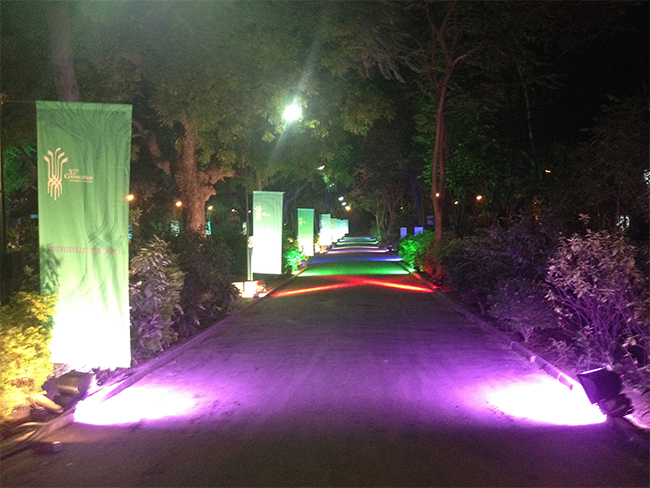
Anand Mahindra
Chairman
Governing Council
Chairman
Governing Council

Pradyumna Vyas
Director, NID
Director, NID

Vijai Singh Katiyar
Activity Chairperson
Professional Education Programmes
Activity Chairperson
Professional Education Programmes
Anand Mahindra
Chairman
Governing Council
National Institute of Design
Chairman
Governing Council
National Institute of Design
The National Institute of Design (NID) sets new paradigms in every way through its commitment to design education and proficiency. Every batch of graduates brings
forth renewed design sensibilities and a new wave of design thinking, while continuing to remain grounded in real life concerns,
as their choice of projects shows.
Design has the potential to influence change, and students at NID nurture a genuine concern for improving the quality of human lives. Whether in the context of the social sector or the industrial sector, the institute has always been instrumental in equipping its students with the best design practices that bring them at par with their global counterparts. Indigenous design solutions have great value and vast industrial potential; and if harnessed properly, can enhance the economic growth of the country. NID has always understood and encouraged this.
NID is home to a unique, multidisciplinary educational system, offering 18 different disciplines, and a sizable number of international collaborations. All of these are instrumental in creating new domains of knowledge in the field of design. Its students absorb the best in global design practices and thought leadership. Through its best practices and path-breaking research initiatives, NID has succeeded in creating a new vision for students, equipping them with a perceptive understanding of societal problems and the insight to come up with design solutions to address them.
Today’s times provide an opportunity for designers to play a proactive and constructive role in identifying the changes that occur in society. They need to understand and acknowledge the uncertainty that these sudden changes bring in their wake and design solutions that can help people to successfully adjust and adapt. NID provides a platform to share new ideas and world-views and see them invigorate the vision of its design initiatives. Students are trained to produce work that is guided by investigation into the existing and upcoming trends in a global scenario and judge for themselves the appropriate design innovation that would suit a country as vast as India with its heterogeneous needs.
I am confident that this year’s graduates will contribute greatly to nation building activities in their capacity as designers. I would like to congratulate all our graduates on this happy occasion and wish them well in their future careers.
Design has the potential to influence change, and students at NID nurture a genuine concern for improving the quality of human lives. Whether in the context of the social sector or the industrial sector, the institute has always been instrumental in equipping its students with the best design practices that bring them at par with their global counterparts. Indigenous design solutions have great value and vast industrial potential; and if harnessed properly, can enhance the economic growth of the country. NID has always understood and encouraged this.
NID is home to a unique, multidisciplinary educational system, offering 18 different disciplines, and a sizable number of international collaborations. All of these are instrumental in creating new domains of knowledge in the field of design. Its students absorb the best in global design practices and thought leadership. Through its best practices and path-breaking research initiatives, NID has succeeded in creating a new vision for students, equipping them with a perceptive understanding of societal problems and the insight to come up with design solutions to address them.
Today’s times provide an opportunity for designers to play a proactive and constructive role in identifying the changes that occur in society. They need to understand and acknowledge the uncertainty that these sudden changes bring in their wake and design solutions that can help people to successfully adjust and adapt. NID provides a platform to share new ideas and world-views and see them invigorate the vision of its design initiatives. Students are trained to produce work that is guided by investigation into the existing and upcoming trends in a global scenario and judge for themselves the appropriate design innovation that would suit a country as vast as India with its heterogeneous needs.
I am confident that this year’s graduates will contribute greatly to nation building activities in their capacity as designers. I would like to congratulate all our graduates on this happy occasion and wish them well in their future careers.
Pradyumna Vyas
Director, NID
Director, NID
This has been a truly memorable academic year as the National Institute of Design (NID) came to be recognised as an Institute of National Importance.
Indeed, it is due to NID’s steadfast contribution of more than fifty years to the field of design education, research, practice, training, and service;
that the institute has been honoured with this status. Design education at the institute has been inspirational enough to enable students to navigate
new vistas of knowledge and carve a niche for themselves in the world of design.
NID encourages research through innovative academic practices; thus giving its students encouragement and confidence to take up challenging projects that foster critical thinking, creativity and imagination. All the projects done by graduating students this year, reveal a superlative balance between aesthetics and social responsibility. With its focus on social innovation, ecological design, and sustainable technology, NID has also taught its students the value of inclusive growth. Apart from academic activities, this year has also been an exciting one with several remarkable conferences, seminars, exhibitions, workshops, symposia, and the Alpavirama film festival. The institute has indeed been proud to host all of these.
This edition of Young Designers highlights the creative design talent of this year’s graduates. They have always strived for excellence and the same is evident in their diploma projects. On the occasion of the 35th Convocation, I wish them the very best for their future endeavours and encourage them to continue exploring new frontiers in design. NID has imparted them with all the knowledge and skills necessary for quality leadership. I am confident that they can face the world with all the challenges it poses and carry out their responsibilities as graduates of this great institute.
NID encourages research through innovative academic practices; thus giving its students encouragement and confidence to take up challenging projects that foster critical thinking, creativity and imagination. All the projects done by graduating students this year, reveal a superlative balance between aesthetics and social responsibility. With its focus on social innovation, ecological design, and sustainable technology, NID has also taught its students the value of inclusive growth. Apart from academic activities, this year has also been an exciting one with several remarkable conferences, seminars, exhibitions, workshops, symposia, and the Alpavirama film festival. The institute has indeed been proud to host all of these.
This edition of Young Designers highlights the creative design talent of this year’s graduates. They have always strived for excellence and the same is evident in their diploma projects. On the occasion of the 35th Convocation, I wish them the very best for their future endeavours and encourage them to continue exploring new frontiers in design. NID has imparted them with all the knowledge and skills necessary for quality leadership. I am confident that they can face the world with all the challenges it poses and carry out their responsibilities as graduates of this great institute.
Vijai Singh Katiyar
Activity Chairperson
Professional Education Programmes
National Institute of Design
Activity Chairperson
Professional Education Programmes
National Institute of Design
Professional education is seen as a stepping-stone to industry, a step closer to career. It must not only live up to the expectations of society,
but deliver a significant gain in skills and professional maneuverability. The outgoing students from NID once again demonstrate their preparedness
through their final project in this edition of Young Designers. While I congratulate them for diverse issues they have dealt with, I felicitate
the faculty members who strived to nurture values and essential competencies for need appreciation and creative problem solving
in the the young designers.
Design and professional education can inextricably be linked—design helps disciplines regenerate and overcome redundancy. When the world is changing rapidly, there is no reason to continue with the same inputs and courses. Rejuvenation is desirable from sociocultural perspective, as well. Periodic restructuring of curriculum is necessary for innovation and useful to identify new resources and upcoming knowledge.
Today, more people are turning to design as for a career. Many wish to switch over to their passion and creativity. These learners demand education programmes with ideas and flexibility. They must be able to choose their paths depending on their interest and aspirations. This requires creatively networking inputs, processes and ecosystems
A key requirement in design education today, besides training professionally competent students, is the quality and direction of research. Research in exploring patterns and profiles across domains reinforces value to design. Such initiatives contextualise the academic content across disciplines. It also means that present day research will lay the foundation for tomorrow’s quality benchmarks, and in defining meaningful characteristic programmes. A thriving culture of research will help build required ecosystems.
India needs to encourage entrepreneurship in creative industries on a national scale and with international benchmarks. It has been the pursuit of NID’s faculty to recognise emerging needs and respond to such challenges pro-actively, through curriculum design and pedagogy. NID’s education philosophy hinges on the belief that design education should facilitate students to experiment with markets, take risks and breed networks using contemporary skills. It moulds and encourages innovation, irrespective of the domain.
The role of an institute like NID is therefore a crucial one, in meeting future goals of social and economic development—the world needs a dynamic, non-static curriculum.
Design and professional education can inextricably be linked—design helps disciplines regenerate and overcome redundancy. When the world is changing rapidly, there is no reason to continue with the same inputs and courses. Rejuvenation is desirable from sociocultural perspective, as well. Periodic restructuring of curriculum is necessary for innovation and useful to identify new resources and upcoming knowledge.
Today, more people are turning to design as for a career. Many wish to switch over to their passion and creativity. These learners demand education programmes with ideas and flexibility. They must be able to choose their paths depending on their interest and aspirations. This requires creatively networking inputs, processes and ecosystems
A key requirement in design education today, besides training professionally competent students, is the quality and direction of research. Research in exploring patterns and profiles across domains reinforces value to design. Such initiatives contextualise the academic content across disciplines. It also means that present day research will lay the foundation for tomorrow’s quality benchmarks, and in defining meaningful characteristic programmes. A thriving culture of research will help build required ecosystems.
India needs to encourage entrepreneurship in creative industries on a national scale and with international benchmarks. It has been the pursuit of NID’s faculty to recognise emerging needs and respond to such challenges pro-actively, through curriculum design and pedagogy. NID’s education philosophy hinges on the belief that design education should facilitate students to experiment with markets, take risks and breed networks using contemporary skills. It moulds and encourages innovation, irrespective of the domain.
The role of an institute like NID is therefore a crucial one, in meeting future goals of social and economic development—the world needs a dynamic, non-static curriculum.




